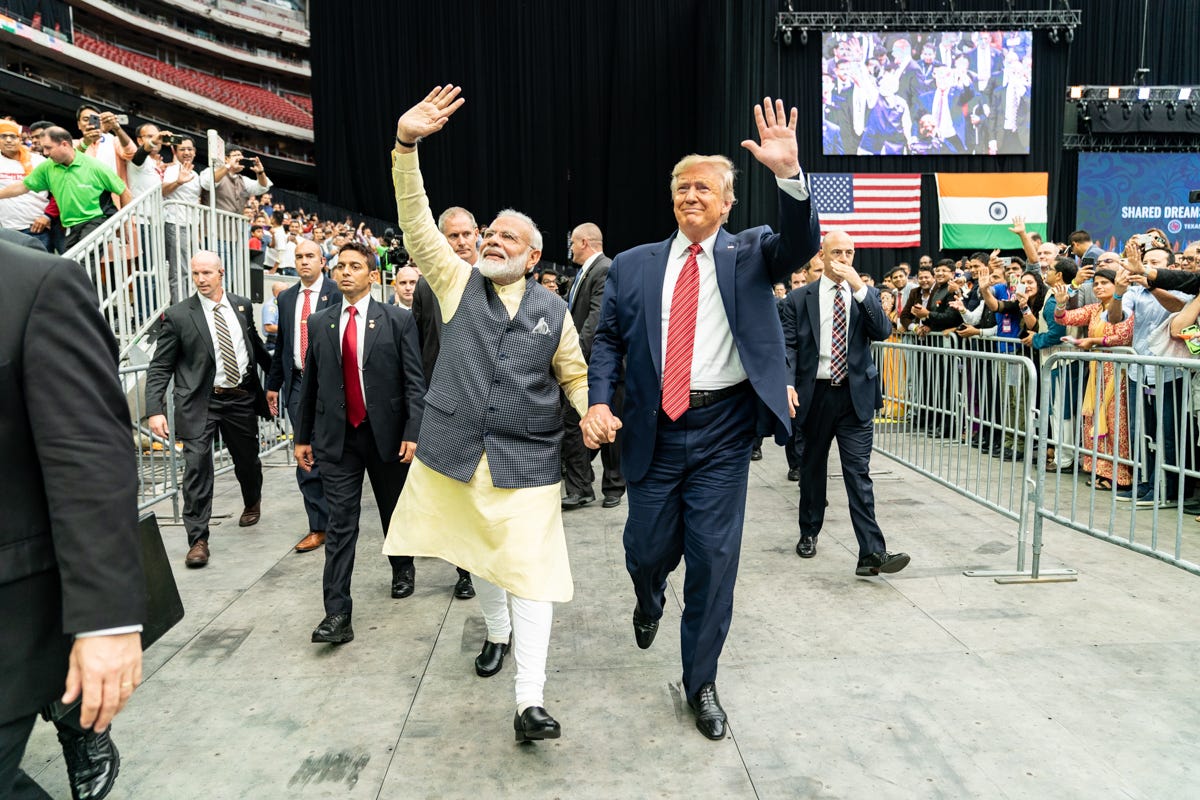The Rise Of Republican Hindutva
Hindu Nationalism & the Far-Right is Converging on U.S. Governance & Civil Society
Amandeep Singh
December 4, 2024 | 4.5 min. read | Opinion
A disturbing pattern is emerging in the American political landscape: the systematic rise of Hindu Nationalist (Hindutva) ideology in Republican politics, facilitated by high-profile appointments, lobbying efforts, and far-right collaborations. This growing alliance poses significant threats to civil society, minority rights, and the foundations of democracy in the United States.
The recent appointments of Tulsi Gabbard and Kash Patel, both documented supporters of the Hindu Nationalist BJP and Prime Minister Modi, alongside Vivek Ramaswamy, reflect the encroachment of pro-Hindutva supporters into pivotal government roles.
Gabbard has long maintained associations with Hindu supremacist networks such as the Rashtriya Swayamsevak Sangh (RSS), a Hindu paramilitary group inspired by European fascism. Patel, a senior advisor with far-right leanings who supported the construction of a Hindu temple upon the demolished Babri mosque, represents the deepening intersection of Hindu Nationalism and American conservatism. Ramaswamy’s Republican platform blends Hindutva and White nationalist rhetoric.
Similarly, Shri Thanedar, a U.S. Congressman from Michigan, has championed Modi’s policies, and Raja Krishnamoorthi, a Congressman from Illinois, has faced scrutiny for his connections to Hindu Nationalist groups.
These figures illustrate the growing influence of Hindutva thinking in American politics, shaping narratives and policies that align with exclusionary, far-right agendas. This phenomenon is not isolated but part of a broader Republican Hindutva agenda.
Organizations like the American Sangh—a network of U.S.-based Hindutva groups—have strategically embedded themselves in Republican circles. Their efforts include the establishment of PACs, such as the Republican Hindu Coalition and Americans4Hindus, which openly endorse right-wing candidates and Hindu Nationalist narratives.
A Transnational Agenda and an Ideological Convergence
The growing collaboration between the U.S. Far Right and Hindutva ideologues was fully displayed at the 2024 National Conservatism Conference (NatCon).
Key Hindu nationalist figures such as Ram Madhav (RSS) and Swapan Dasgupta (BJP), advocates of mass homogenizing nationalist ideologies like Akhand Bharat, addressed the event, emphasizing the “success story” of Hindu Nationalism in India and advocating for its role in steering the global conservative movement. An ideology which has promoted authoritarian strategies that target minorities, dismantle democratic norms, and exploit grievance politics.
As strategist Steve Bannon once remarked, Indian Prime Minister Narendra Modi was “a Trump before Trump,” reflecting the ideological and strategic synergies between Hindutva and the global Far Right. Modi’s government has actively facilitated this transnational agenda, encouraging the American Sangh to advance its Hindutva ideology under the guise of promoting “Hindu American” representation.
The resonance between Hindu supremacy and White supremacy is neither superficial nor incidental.
European Indology’s fabricated notion of a shared Aryan racial origin for Brahmins and Europeans forged a deep historical link, valorized by the Nazi regime, which revered the Hindu caste-racial hierarchy as a model of social order.
SS head Heinrich Himmler was, for example, captivated by the Bhagavad Gita, misusing its teachings to justify genocidal violence. Himmler argued that true greatness lay in sacrificing one’s humanity for the nation, echoing Krishna’s exhortation to Arjuna to kill without moral hesitation. This rhetoric enabled, in part, Nazi soldiers to commit atrocities with impunity.
Today, this ideological alignment persists, with White supremacist manifestos—from Anders Breivik in Norway to the Christchurch shooter in New Zealand and Wade Michael Page in Michigan—glorifying Hindutva and caste systems as models for racial domination.
A Threat to U.S. Civil Society and South Asian Minorities
The growing infiltration of pro-Hindutva actors into the U.S. government and civil society directly endangers South Asian minorities, replicating the violence faced in India. The RSS’s Hindu supremacist agenda of violent subordination of Muslims, Sikhs, Christians, and Dalits in India extends into the diaspora through surveillance, intimidation, and even assassination plots.
Recent cases include the FBI investigation into an attempt on the life of Sikh activist Gurpatwant Singh Pannun in New York and the unresolved murder of Canadian Sikh leader Hardeep Singh Nijjar, believed to involve Indian state actors.
The American Sangh’s strategy includes leveraging its status as a “model minority” to align with White supremacists. While Hindutva positions itself as an aggrieved minority to gain political leverage, it simultaneously advances an exclusionary and violent agenda against other minorities, exemplified by campaigns against fighting caste discrimination under the guise of opposing “Critical Caste Theory.”
Western civil society must move beyond superficial critiques of individual political figures and confront the systemic nature of Hindutva supremacy. This is not just a critique of one party, political actors, or even a nation—it is a call to examine how global powers perpetuate an ancient, enduring system of racial and caste violence.
The infiltration of Hindu Nationalists into American governance demands an urgent, unified response.
Civil society organizations, anti-supremacist movements, and South Asian minority groups must collaborate to expose and challenge the transnational networks enabling this far-right convergence. Addressing Republican Hindutva is not a niche issue—it is a fight for democracy, justice, and the protection of marginalized communities in the United States and beyond.
Amandeep Singh is an independent researcher and community activist based in the Bay Area. His work in Sikh critical theory examines Sikh suffering, genocidal violence, and racial-colonial histories. He serves on the board of Lehar International, supporting Sikh students and activists.
Baaz is home to opinions, analysis, and original reporting for the Sikh and Punjabi diaspora. Support us by subscribing. Find us on Twitter, Instagram, and Bluesky at @BaazNewsOrg. If you would like to submit a written piece for consideration please email us at editor@baaznews.org.



Excellent article. These are worrying times.